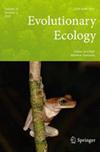树突、蛙类和蟾类蝌蚪对非特异性和异特异性损伤信号的感知(无尾目)
IF 2.1
3区 环境科学与生态学
Q3 ECOLOGY
引用次数: 0
摘要
捕食者与猎物之间的相互作用对生物体的生存至关重要。它们形成了对抗捕食者的机制,通常依赖于感官能力。蝌蚪使用化学线索,如伤害线索(警报线索)来评估捕食风险,并相应地改变其生活史、形态和行为。然而,化学介导的抗捕食者反应在具有不同生态位的物种中(例如在phytotelmata中)的普遍程度仍然未知,这阻碍了我们对报警物质的生态学意义和进化的理解。因此,我们的研究旨在研究两种新热带毒刺蛙(Ranitomeya sirensis和Epipedobates anthonyi)蝌蚪对化学介导的抗捕食者反应(并比较它们对两种已知利用报警物质的古北模式生物,Rana temporaria和Bufo Bufo Bufo Bufo)的反应)。通过行为生物测定,我们将predator-naïve蝌蚪暴露于每个物种的提取物(即非特异性和异种性线索),包括水作为对照(即每个物种五个处理)。我们评估了它们在刺激引入前后的活动变化。我们的研究结果表明,anthonyi对任何刺激都没有反应,而r.s renensis只对同种刺激有反应,而对异种刺激没有反应。因此,我们的研究结果表明,红毛猴有一个专门的识别系统,可能针对同种竞争对手,但可能与反捕食者机制无关。相比之下,安东尼可能对损伤线索不敏感,或者利用其他感觉方式来应对急性捕食事件。本研究揭示了新热带毒镖蛙蝌蚪的化学报警反应系统,为了解石蛙对损伤线索的反应提供了基础。该研究提出了关于物种在发育过程中面临极端资源限制时化学通讯的生态意义和进化意义的问题,并强调了比较研究对理解不同水生生态系统中化学通讯的重要性。本文章由计算机程序翻译,如有差异,请以英文原文为准。

Perception of con- and heterospecific injury cues in tadpoles of dendrobatid, ranid and bufonid frogs (Anura)
Abstract Predator-prey interactions are vital for organismal survival. They shape anti-predator mechanisms and often depend on sensory abilities. Tadpoles use chemical cues, such as injury cues (alarm cues), to assess predation risks and modify their life-history, morphology, and behaviours accordingly. However, the prevalence of chemically mediated anti-predator responses in species with distinct ecological niches (e.g. within phytotelmata) remains unknown, hindering our understanding of the ecological significance and evolution of alarm substances. Therefore, our study aimed to investigate chemically mediated anti-predator responses in tadpoles of two Neotropical poison dart frogs, Ranitomeya sirensis and Epipedobates anthonyi (and compare their responses to two Palearctic model organisms, Rana temporaria and Bufo bufo , which are known to utilise alarm substances). Through behavioural bioassays, we exposed predator-naïve tadpoles to extracts of each species (i.e. con- and heterospecific cues), including water as a control (i.e. five treatments per species). We assessed changes in their activity before and after stimulus introduction. Our results show that E. anthonyi did not respond to any of the stimuli, whereas R. sirensis displayed increased activity levels exclusively in response to conspecific cues, but not to heterospecific cues. With this, our findings suggest a specialized recognition system in R. sirensis , potentially directed at conspecific competitors but likely unrelated to anti-predator mechanisms. In contrast, E. anthonyi may be insensitive to injury cues or utilize alternative sensory modalities to respond to acute predation events. This study sheds light on the chemical alarm response system of Neotropical poison dart frog tadpoles, providing foundational understanding of how dendrobatids react to injury cues. It prompts questions about the ecological significance and evolutionary implications of chemical communication in species facing extreme resource limitation during development and underscores the importance of comparative research for understanding chemical communication in diverse aquatic ecosystems.
求助全文
通过发布文献求助,成功后即可免费获取论文全文。
去求助
来源期刊

Evolutionary Ecology
环境科学-进化生物学
CiteScore
3.00
自引率
5.30%
发文量
70
审稿时长
3 months
期刊介绍:
Evolutionary Ecology is a concept-oriented journal of biological research at the interface of ecology and evolution. We publish papers that therefore integrate both fields of research: research that seeks to explain the ecology of organisms in the context of evolution, or patterns of evolution as explained by ecological processes.
The journal publishes original research and discussion concerning the evolutionary ecology of organisms. These may include papers addressing evolutionary aspects of population ecology, organismal interactions and coevolution, behaviour, life histories, communication, morphology, host-parasite interactions and disease ecology, as well as ecological aspects of genetic processes. The objective is to promote the conceptual, theoretical and empirical development of ecology and evolutionary biology; the scope extends to any organism or system.
In additional to Original Research articles, we publish Review articles that survey recent developments in the field of evolutionary ecology; Ideas & Perspectives articles which present new points of view and novel hypotheses; and Comments on articles recently published in Evolutionary Ecology or elsewhere. We also welcome New Tests of Existing Ideas - testing well-established hypotheses but with broader data or more methodologically rigorous approaches; - and shorter Natural History Notes, which aim to present new observations of organismal biology in the wild that may provide inspiration for future research. As of 2018, we now also invite Methods papers, to present or review new theoretical, practical or analytical methods used in evolutionary ecology.
Students & Early Career Researchers: We particularly encourage, and offer incentives for, submission of Reviews, Ideas & Perspectives, and Methods papers by students and early-career researchers (defined as being within one year of award of a PhD degree) – see Students & Early Career Researchers
 求助内容:
求助内容: 应助结果提醒方式:
应助结果提醒方式:


